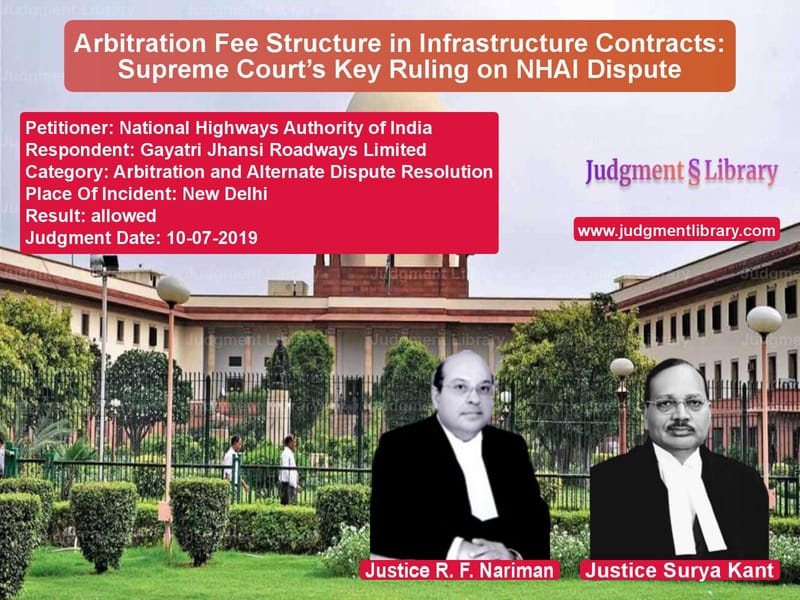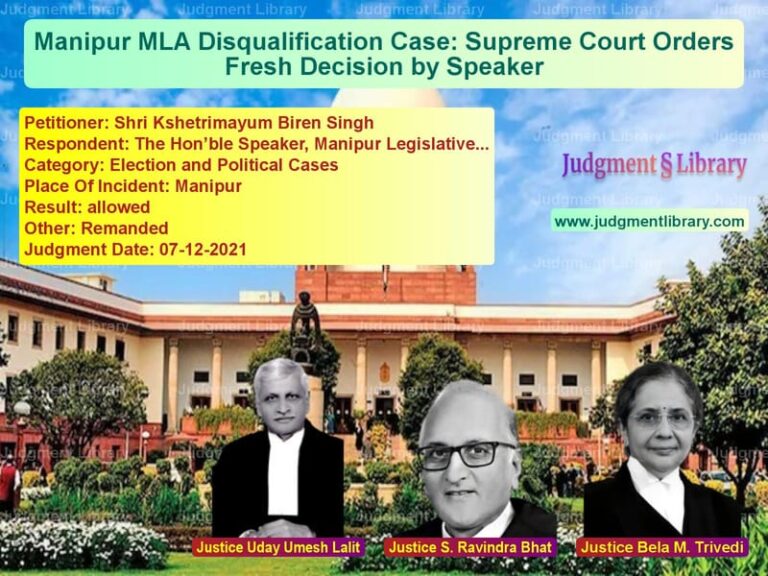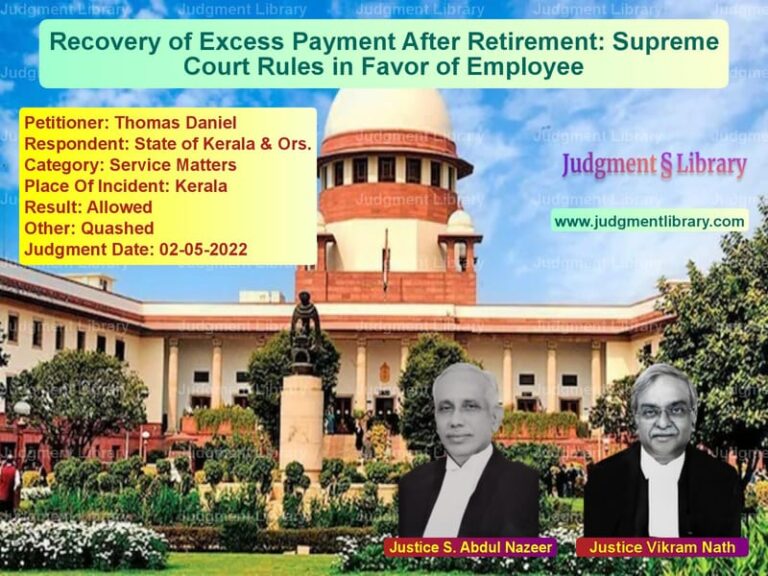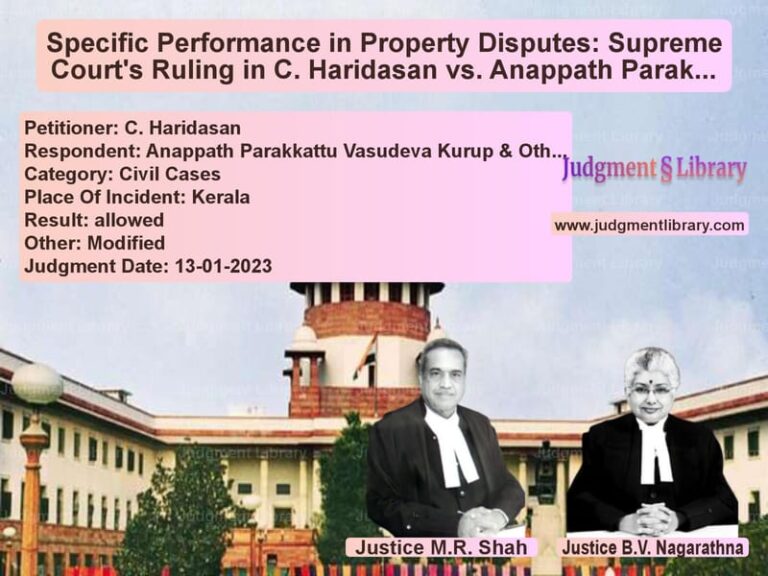Arbitration Fee Structure in Infrastructure Contracts: Supreme Court’s Key Ruling on NHAI Dispute
The Supreme Court of India, in a significant ruling, addressed the enforceability of arbitration fee structures in infrastructure contracts in the case of National Highways Authority of India v. Gayatri Jhansi Roadways Limited. The case revolved around whether arbitration fees should be governed by contractual agreements between parties or by the Fourth Schedule of the Arbitration and Conciliation Act, 1996. This judgment has profound implications for commercial contracts, government tenders, and arbitration practices in India.
The ruling provides clarity on whether arbitrators can unilaterally decide their fees or if the parties’ prior agreement must be honored. With many infrastructure contracts involving arbitration clauses, the outcome of this case sets an important precedent for resolving disputes in similar matters.
Background of the Case
The dispute originated from a contract dated February 7, 2006, between the National Highways Authority of India (NHAI) and Gayatri Jhansi Roadways Limited. The agreement contained an arbitration clause referring disputes to a three-member arbitration tribunal. The contract also specified a fee structure for arbitrators, which was based on NHAI’s policy circular of 2004.
However, when arbitration was invoked in 2017, NHAI issued a new policy circular on June 1, 2017, revising the arbitrators’ fees significantly. The new structure allowed a fee of Rs. 25,000 per day for claims under Rs. 100 crores or a lump sum of Rs. 5 lakhs per case. The dispute arose when the arbitrators, instead of following the revised NHAI fee schedule, decided to determine fees according to the Fourth Schedule of the Arbitration and Conciliation Act, 1996, as amended.
Contractual Fee Structure and Its Revision
The contract included a specific arbitration fee structure that was to be followed in case of disputes. The structure had clear stipulations regarding arbitrators’ fees, including:
- Rs. 5,000 per day for each arbitrator, with a cap of Rs. 1.5 lakh per case.
- Reading fees of Rs. 6,000 per arbitrator.
- Rs. 5,000 for secretarial assistance and Rs. 6,000 towards incidental charges.
- Reimbursement of actual travel and lodging expenses, subject to ceilings.
When disputes arose and arbitration was invoked in 2017, NHAI’s policy update of June 1, 2017, substantially revised these amounts, bringing them in line with market rates. However, the arbitrators ignored this policy and instead adopted the Fourth Schedule under the Arbitration and Conciliation Act, 1996.
Arguments by the Petitioner (NHAI)
NHAI contended that:
- The original contract contained a specific arbitration fee structure, which should be binding on both parties.
- The revised 2017 NHAI policy should govern arbitration proceedings since it was issued before arbitration commenced.
- The arbitrators were exceeding their authority by disregarding the agreed contractual terms and opting for the Fourth Schedule’s fee structure.
- Their decision created uncertainty and inconsistencies in government contracts.
Arguments by the Respondent
Gayatri Jhansi Roadways Limited argued that:
- The arbitration tribunal had the authority to determine fees independently.
- The Fourth Schedule of the Arbitration Act provided a fair and reasonable fee structure.
- The tribunal’s decision to apply the Fourth Schedule was in line with judicial precedent.
- Adopting a government policy retrospectively would be unfair.
High Court Rulings and Supreme Court Intervention
The dispute initially reached the Delhi High Court, where a Single Judge ruled that the Fourth Schedule was binding and that arbitrators were free to decide their fees. This ruling contradicted an earlier decision in NHAI v. Gayatri Jhansi Roadways Limited, which had upheld that contractually agreed fees should be followed.
The conflicting judgments resulted in NHAI challenging the decision before the Supreme Court.
Supreme Court’s Judgment
The Supreme Court, led by Justices R.F. Nariman and Surya Kant, ruled in favor of NHAI, holding that:
“The fee structure agreed upon in the contract must be honored unless mutually altered by the parties. The arbitrators do not have the authority to unilaterally modify the contractual terms.”
It further clarified:
“The revised NHAI policy circular of June 1, 2017, shall govern the fee structure, as it was issued before arbitration commenced.”
The Court also emphasized that the Fourth Schedule is not mandatory unless expressly adopted by the parties.
Key Takeaways from the Ruling
- Contractual Terms are Binding: Arbitration fees must be determined as per the contract unless both parties agree otherwise.
- Policy Changes Apply Prospectively: The Court upheld NHAI’s revised policy since it was in place before arbitration proceedings began.
- Limits on Arbitrator’s Authority: Arbitrators cannot override contractual agreements unless explicitly allowed.
- Arbitration Laws Clarified: The ruling clarifies that the Fourth Schedule is advisory and does not override contractual agreements.
- Government Contracts and Arbitration: The judgment provides clarity on how government contracts should be interpreted in arbitration matters.
Impact of the Judgment
The Supreme Court’s ruling has far-reaching consequences for arbitration practices in India. It reinforces the principle that contractual agreements must be honored and limits the discretionary power of arbitrators to determine their fees. The judgment is particularly significant for government contracts, where arbitration clauses are common.
Conclusion
The ruling reinforces the principle that arbitration agreements must be honored as per their terms. It prevents arbitrators from imposing fee structures unilaterally and ensures consistency in arbitration proceedings in government contracts.
Petitioner Name: National Highways Authority of India.Respondent Name: Gayatri Jhansi Roadways Limited.Judgment By: Justice R. F. Nariman, Justice Surya Kant.Place Of Incident: New Delhi.Judgment Date: 10-07-2019.
Don’t miss out on the full details! Download the complete judgment in PDF format below and gain valuable insights instantly!
Download Judgment: National Highways Au vs Gayatri Jhansi Roadw Supreme Court of India Judgment Dated 10-07-2019.pdf
Direct Downlaod Judgment: Direct downlaod this Judgment
See all petitions in Arbitration Awards
See all petitions in Institutional Arbitration
See all petitions in Enforcement of Awards
See all petitions in Dispute Resolution Mechanisms
See all petitions in Arbitration Act
See all petitions in Judgment by Rohinton Fali Nariman
See all petitions in Judgment by Surya Kant
See all petitions in allowed
See all petitions in supreme court of India judgments July 2019
See all petitions in 2019 judgments
See all posts in Arbitration and Alternate Dispute Resolution Category
See all allowed petitions in Arbitration and Alternate Dispute Resolution Category
See all Dismissed petitions in Arbitration and Alternate Dispute Resolution Category
See all partially allowed petitions in Arbitration and Alternate Dispute Resolution Category







